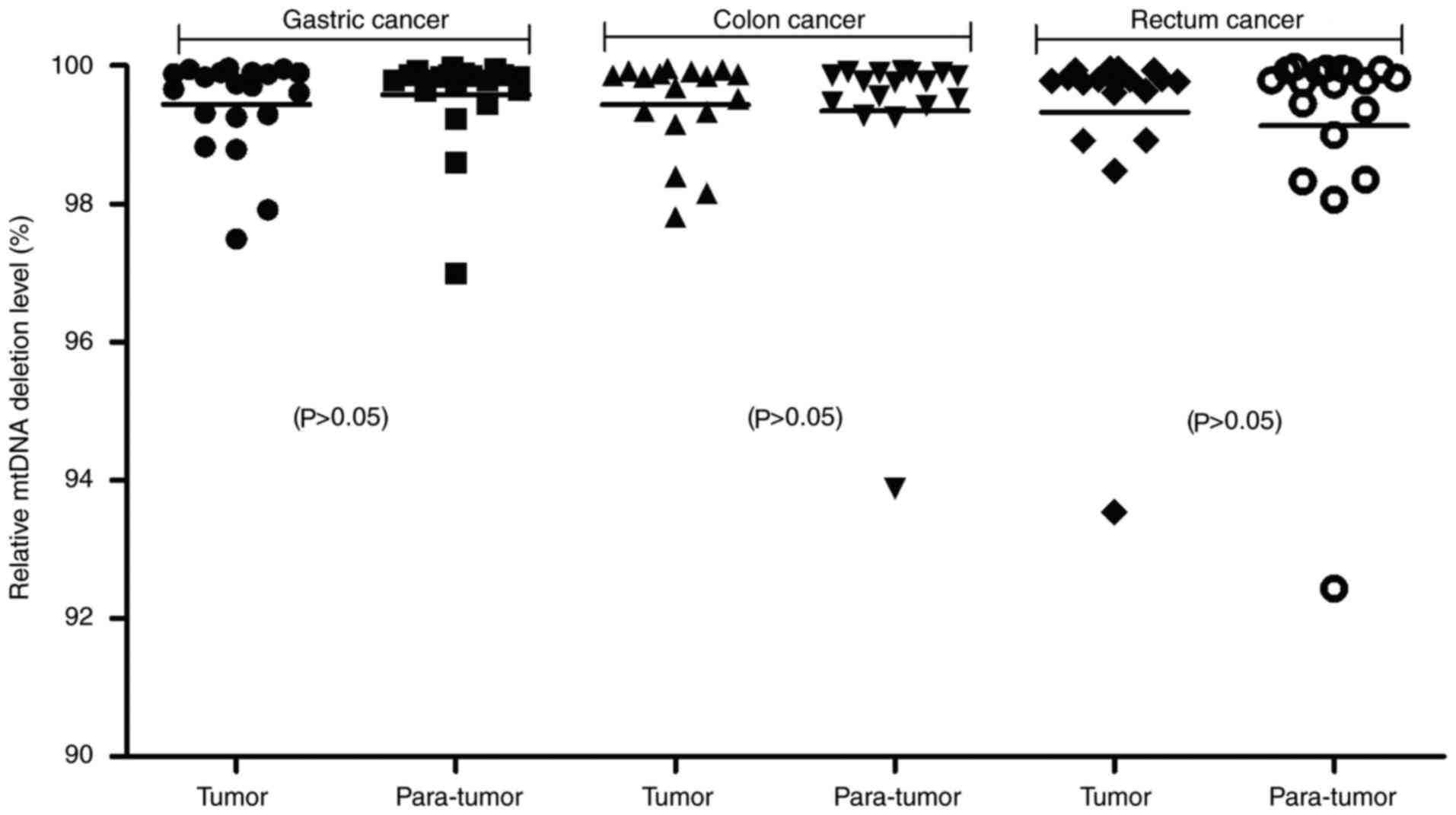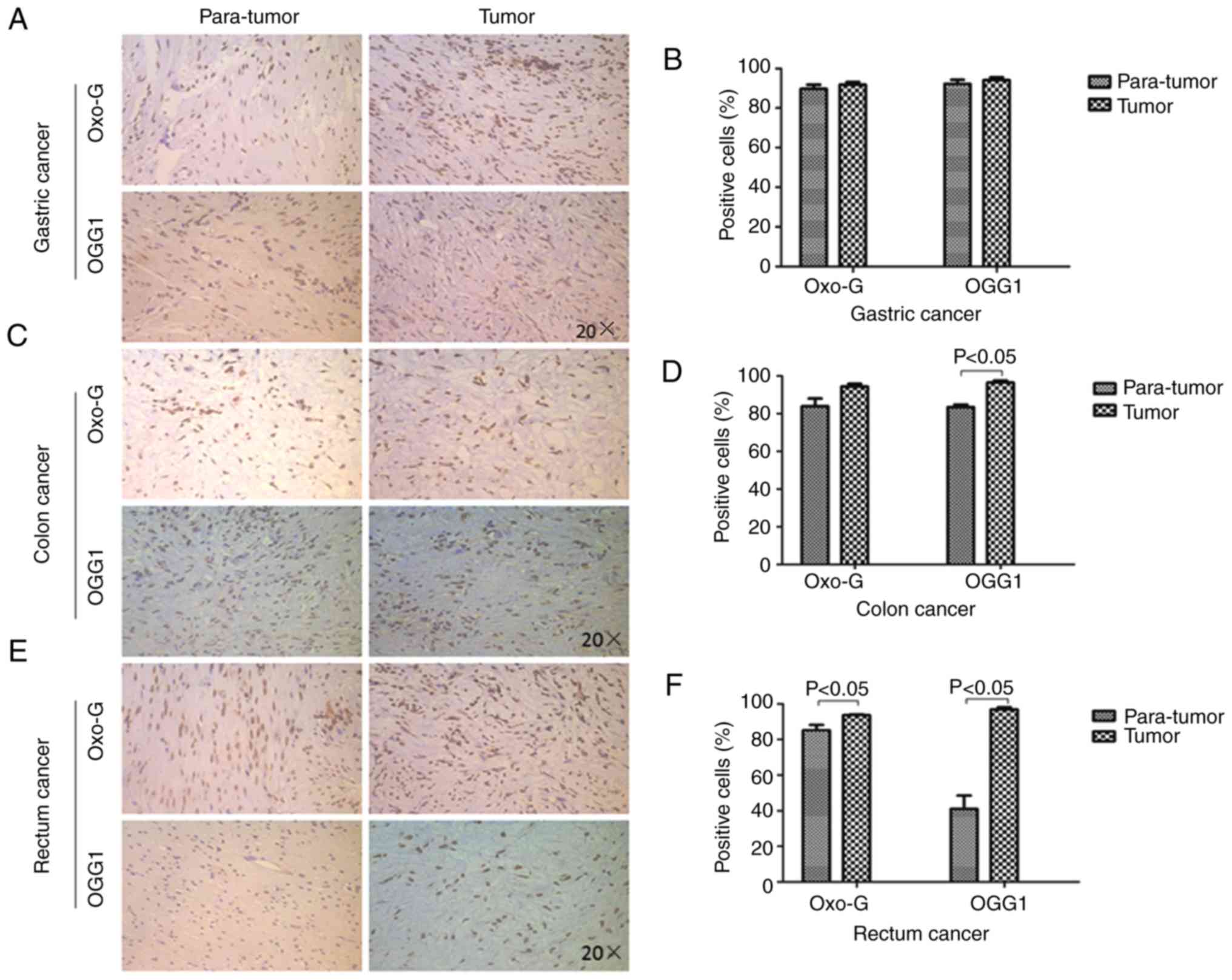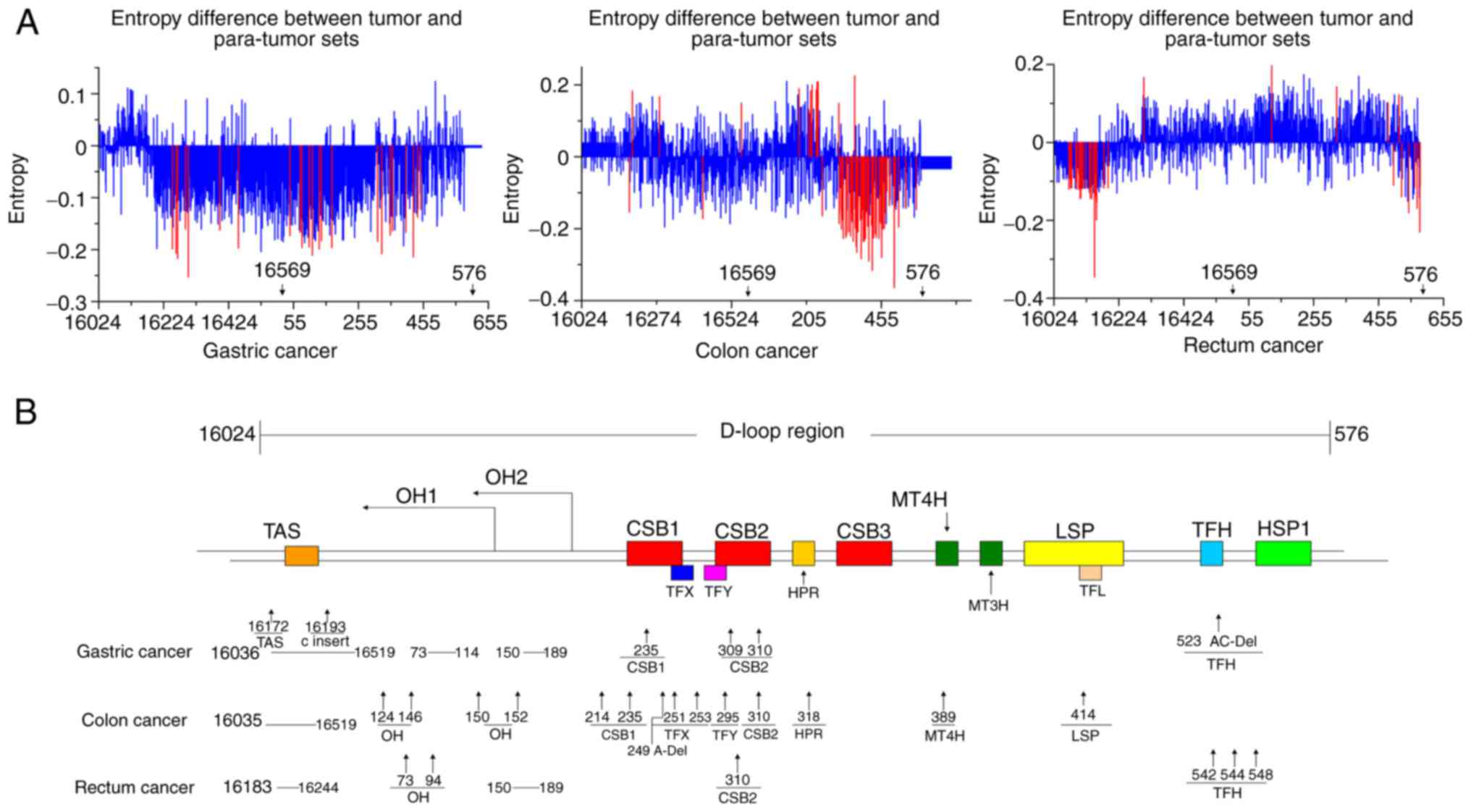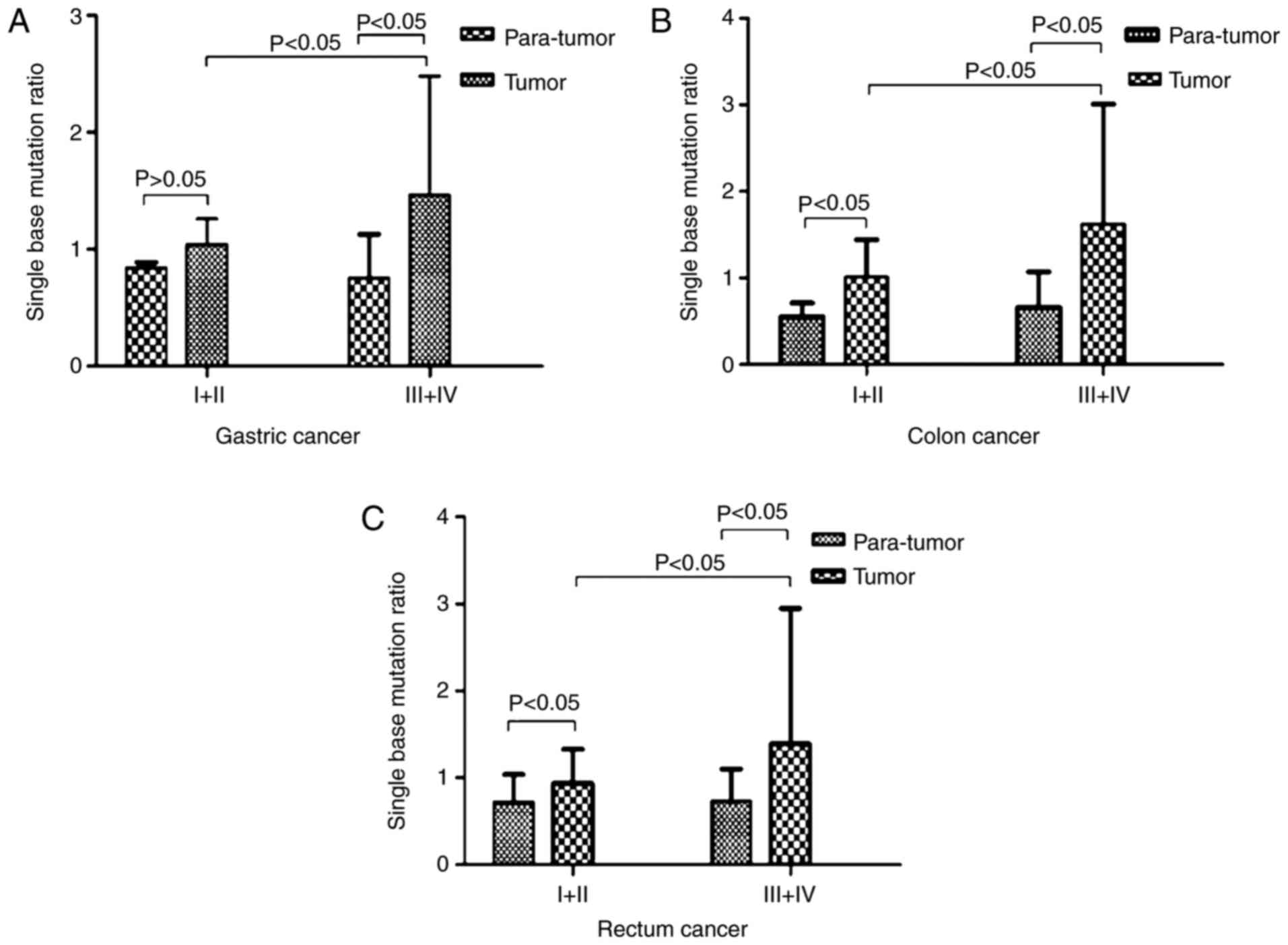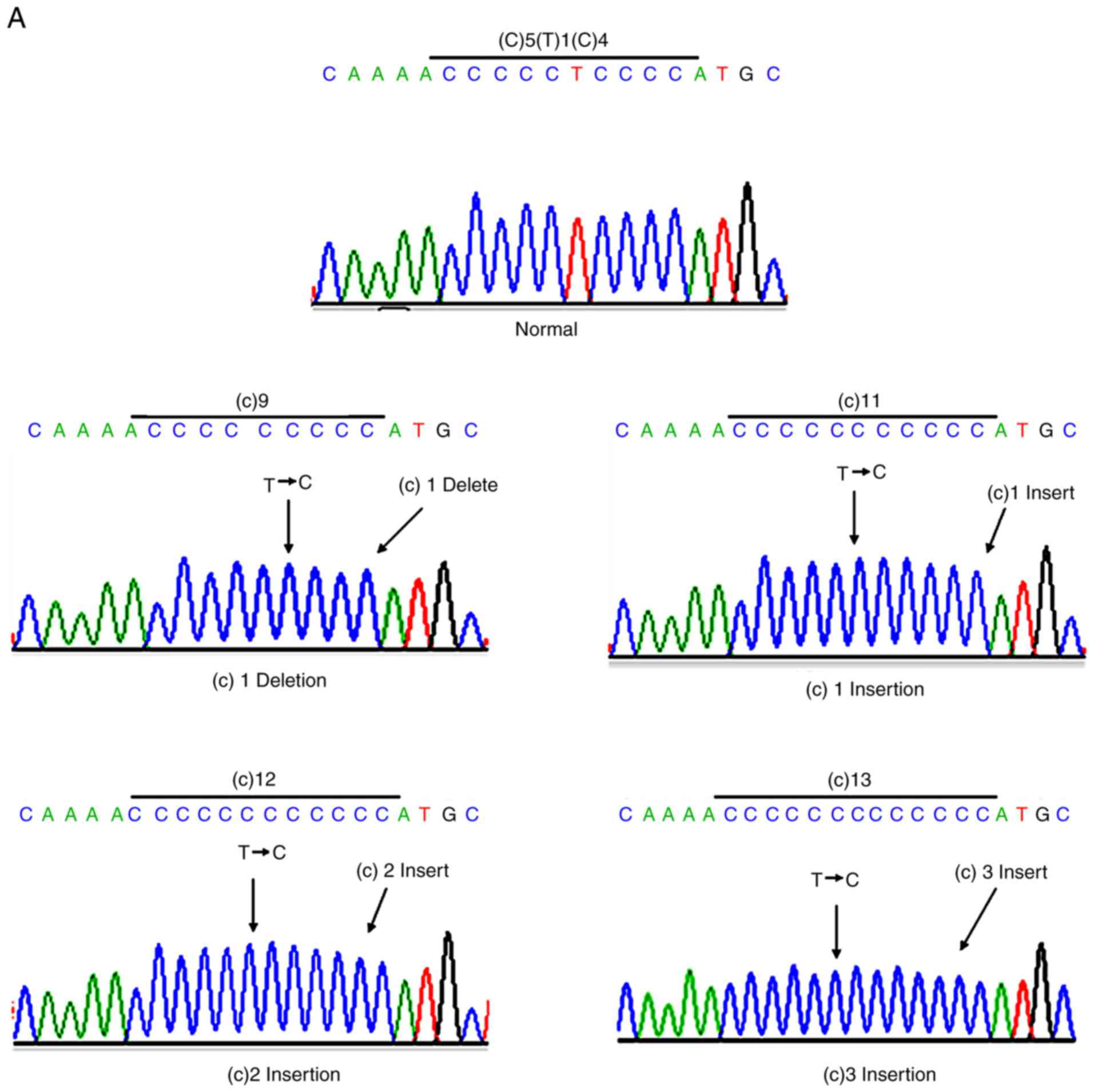|
1
|
Herszenyi L and Tulassay Z: Epidemiology
of gastrointestinal and liver tumors. Eur Rev Med Pharmacol Sci.
14:249–258. 2010.PubMed/NCBI
|
|
2
|
Zhu X and Li J: Gastric carcinoma in
china: Current status and future perspectives (Review). Oncol Lett.
1:407–412. 2010. View Article : Google Scholar : PubMed/NCBI
|
|
3
|
Liu S, Zheng R, Zhang M, Zhang S, Sun X
and Chen W: Incidence and mortality of colorectal cancer in China,
2011. Chin J Cancer Res. 27:22–28. 2015.PubMed/NCBI
|
|
4
|
Chatterjee A, Dasgupta S and Sidransky D:
Mitochondrial subversion in cancer. Cancer Prev Res. 4:638–654.
2011. View Article : Google Scholar
|
|
5
|
Damas J, Samuels DC, Carneiro J, Amorim A
and Pereira F: Mitochondrial DNA rearrangements in health and
disease-a comprehensive study. Hum Mutat. 35:1–14. 2014. View Article : Google Scholar : PubMed/NCBI
|
|
6
|
Yang Y, Yang X, Zhai F, et al: Dietary
guidelines for chinese (2016). J Acad Nutr Dietetics. 116:A37.
2016. View Article : Google Scholar
|
|
7
|
Zhang Y, Wang M, Li H, Zhang H, Shi Y, Wei
F, Liu D, Liu K and Chen D: Accumulation of nuclear and
mitochondrial DNA damage in the frontal cortex cells of patients
with HIV-associated neurocognitive disorders. Brain Res. 1458:1–11.
2012. View Article : Google Scholar : PubMed/NCBI
|
|
8
|
He L, Chinnery PF, Durham SE, Blakely EL,
Wardell TM, Borthwick GM, Taylor RW and Turnbull DM: Detection and
quantification of mitochondrial DNA deletions in individual cells
by real-time PCR. Nucleic Acids Res. 30:e682002. View Article : Google Scholar : PubMed/NCBI
|
|
9
|
Krishnan KJ, Bender A, Taylor RW and
Turnbull DM: A multiplex real-time PCR method to detect and
quantify mitochondrial DNA deletions in individual cells. Anal
Biochem. 370:127–129. 2007. View Article : Google Scholar : PubMed/NCBI
|
|
10
|
Perier C, Bender A, Garcia-Arumi E, Melià
MJ, Bové J, Laub C, Klopstock T, Elstner M, Mounsey RB, Teismann P,
et al: Accumulation of mitochondrial DNA deletions within
dopaminergic neurons triggers neuroprotective mechanisms. Brain.
136:2369–2378. 2013. View Article : Google Scholar : PubMed/NCBI
|
|
11
|
Livak KJ and Schmittgen TD: Analysis of
relative gene expression data using real-time quantitative PCR and
the 2−ΔΔCT method. Methods. 25:402–408. 2001. View Article : Google Scholar : PubMed/NCBI
|
|
12
|
Zhang Y, Song F, Gao Z, Ding W, Qiao L,
Yang S, Chen X, Jin R and Chen D: Long-term exposure of mice to
nucleoside analogues disrupts mitochondrial DNA maintenance in
cortical neurons. PLoS One. 9:e856372014. View Article : Google Scholar : PubMed/NCBI
|
|
13
|
Shi Y, Wang J, Wang Y, Wang A, Guo H, Wei
F, Mehta SR, Espitia S, Smith DM, Liu L, et al: A novel mutant
10ala/arg together with mutant 144Ser/arg of hepatitis B virus X
protein involved in hepatitis B virus-related hepatocarcinogenesis
in HepG2 cell lines. Cancer Lett. 371:285–291. 2016. View Article : Google Scholar : PubMed/NCBI
|
|
14
|
Liu F, Yu DM, Huang SY, Yu JL, Zhang DH,
Gong QM and Zhang XX: Clinical implications of evolutionary
patterns of homologous, full-length hepatitis B virus quasispecies
in different hosts after perinatal infection. J Clin Microbiol.
52:1556–1565. 2014. View Article : Google Scholar : PubMed/NCBI
|
|
15
|
Ouyang Y, Liu L, Zhang Y, Yuan L, Liu Z,
Yang S, Wei F, Qiao L and Chen D: Discordant patterns of
tissue-specific genetic characteristics in the HIV-1 env gene from
HIV-associated neurocognitive disorder (HAND) and non-HAND
patients. J Neurovirol. 20:332–340. 2014. View Article : Google Scholar : PubMed/NCBI
|
|
16
|
Oberley TD: Oxidative damage and cancer.
Am J Pathol. 160:403–408. 2002. View Article : Google Scholar : PubMed/NCBI
|
|
17
|
Boiteux S and Radicella JP: Base excision
repair of 8-hydroxyguanine protects DNA from endogenous oxidative
stress. Biochimie. 81:59–67. 1999. View Article : Google Scholar : PubMed/NCBI
|
|
18
|
Liang Q, Zeng J, Wu J, Qiao L, Chen Q,
Chen D and Zhang Y: Nucleoside reverse transcriptase inhibitors
induced hepatocellular mitochondrial DNA lesions and compensatory
enhancement of mitochondrial function and DNA repair. Int J
Antimicrob Agents. 51:385–392. 2018. View Article : Google Scholar : PubMed/NCBI
|
|
19
|
Han CB, Li F, Zhao YJ, Ma JM, Wu DY, Zhang
YK and Xin Y: Variations of mitochondrial D-loop region plus
downstream gene 1 2S rRNA-tRNAphe and gastric
carcinomas. World J Gastroenterol. 9:1925–1929. 2003. View Article : Google Scholar : PubMed/NCBI
|
|
20
|
Lee HC, Li SH, Lin JC, Wu CC, Yeh DC and
Wei YH: Somatic mutations in the D-loop and decrease in the copy
number of mitochondrial DNA in human hepatocellular carcinoma.
Mutat Res. 547:71–78. 2004. View Article : Google Scholar : PubMed/NCBI
|
|
21
|
Levy M, Visokai V, Lipska L and Topolcan
O: Tumor markers in staging and prognosis of colorectal carcinoma.
Neoplasma. 55:138–142. 2008.PubMed/NCBI
|
|
22
|
Chatterjee A, Mambo E and Sidransky D:
Mitochondrial DNA mutations in human cancer. Oncogene.
25:4663–4674. 2006. View Article : Google Scholar : PubMed/NCBI
|
|
23
|
Venderbosch S, van Vliet S, Craenmehr MH,
Simmer F, de Haan AF, Punt CJ, Koopman M and Nagtegaal ID:
Mitochondrial microsatellite instability in patients with
metastatic colorectal cancer. Virchows Archiv. 466:495–502. 2015.
View Article : Google Scholar : PubMed/NCBI
|
|
24
|
Jeong CW, Lee JH, Sohn SS, Ryu SW and Kim
DK: Mitochondrial microsatellite instability in gastric cancer and
gastric epithelial dysplasia as a precancerous lesion. Cancer
Epidemiol. 34:323–327. 2010. View Article : Google Scholar : PubMed/NCBI
|
|
25
|
Wallace DC: Mitochondria and cancer. Nat
Rev Cancer. 12:685–698. 2012. View
Article : Google Scholar : PubMed/NCBI
|
|
26
|
Boland ML, Chourasia AH and Macleod KF:
Mitochondrial dysfunction in cancer. Front Oncol. 3:2922013.
View Article : Google Scholar : PubMed/NCBI
|
|
27
|
Webb E, Broderick P, Chandler I, Lubbe S,
Penegar S, Tomlinson IP and Houlston RS: Comprehensive analysis of
common mitochondrial DNA variants and colorectal cancer risk. Br J
Cancer. 99:2088–2093. 2008. View Article : Google Scholar : PubMed/NCBI
|
|
28
|
Heerdt BG, Chen J, Stewart LR and
Augenlicht LH: Polymorphisms, but lack of mutations or instability,
in the promotor region of the mitochondrial genome in human colonic
tumors. Cancer Res. 54:3912–3915. 1994.PubMed/NCBI
|
|
29
|
Hibi K, Nakayama H, Yamazaki T, Takase T,
Taguchi M, Kasai Y, Ito K, Akiyama S and Nakao A: Detection of
mitochondrial DNA alterations in primary tumors and corresponding
serum of colorectal cancer patients. Int J Cancer. 94:429–431.
2001. View
Article : Google Scholar : PubMed/NCBI
|
|
30
|
Wu CW, Yin PH, Hung WY, Li AF, Li SH, Chi
CW, Wei YH and Lee HC: Mitochondrial DNA mutations and
mitochondrial DNA depletion in gastric cancer. Genes Chromosomes
Cancer. 44:19–28. 2005. View Article : Google Scholar : PubMed/NCBI
|
|
31
|
Hung WY, Wu CW, Yin PH, Chang CJ, Li AF,
Chi CW, Wei YH and Lee HC: Somatic mutations in mitochondrial
genome and their potential roles in the progression of human
gastric cancer. Biochim Biophys Acta. 1800:264–270. 2010.
View Article : Google Scholar : PubMed/NCBI
|
|
32
|
Burgart LJ, Zheng J, Shu Q, Strickler JG
and Shibata D: Somatic mitochondrial mutation in gastric cancer. Am
J Pathol. 147:1105–1111. 1995.PubMed/NCBI
|
|
33
|
Lievre A, Chapusot C, Bouvier AM,
Zinzindohoué F, Piard F, Roignot P, Arnould L, Beaune P, Faivre J
and Laurent-Puig P: Clinical value of mitochondrial mutations in
colorectal cancer. J Clin Oncol. 23:3517–3525. 2005. View Article : Google Scholar : PubMed/NCBI
|
|
34
|
Kassem AM, El-Guendy N, Tantawy M,
Abdelhady H, El-Ghor A and Wahab Abdel AH: Mutational hotspots in
the mitochondrial D-loop region of cancerous and precancerous
colorectal lesions in egyptian patients. DNA Cell Biol. 30:899–906.
2011. View Article : Google Scholar : PubMed/NCBI
|
|
35
|
Ferreira A, Serafim TL, Sardao VA and
Cunha-Oliveira T: Role of mtDNA-related mitoepigenetic phenomena in
cancer. Eur J Clin Invest. 1 Suppl 45:S44–S49. 2015. View Article : Google Scholar
|
|
36
|
Iommarini L, Kurelac I, Capristo M,
Calvaruso MA, Giorgio V, Bergamini C, Ghelli A, Nanni P, De
Giovanni C, Carelli V, et al: Different mtDNA mutations modify
tumor progression in dependence of the degree of respiratory
complex I impairment. Hum Mol Genet. 23:1453–1466. 2014. View Article : Google Scholar : PubMed/NCBI
|
|
37
|
Berridge MV, Dong L and Neuzil J:
Mitochondrial DNA in tumor initiation, progression, and metastasis:
Role of horizontal mtDNA transfer. Cancer Res. 75:3203–3208. 2015.
View Article : Google Scholar : PubMed/NCBI
|
|
38
|
Tamura G, Nishizuka S, Maesawa C, Suzuki
Y, Iwaya T, Sakata K, Endoh Y and Motoyama T: Mutations in
mitochondrial control region DNA in gastric tumours of Japanese
patients. Eur J Cancer. 35:316–319. 1999. View Article : Google Scholar : PubMed/NCBI
|
|
39
|
Hung WY, Lin JC, Lee LM, Wu CW, Tseng LM,
Yin PH, Chi CW and Lee HC: Tandem duplication/triplication
correlated with poly-cytosine stretch variation in human
mitochondrial DNA D-loop region. Mutagenesis. 23:137–142. 2008.
View Article : Google Scholar : PubMed/NCBI
|
|
40
|
Wang C, Zhao S, Du Y and Guo Z: Single
nucleotide polymorphisms in the D-loop region of mitochondrial DNA
is associated with colorectal cancer outcome. Mitochondrial DNA A
DNA Mapp Seq Anal. 27:4361–4363. 2016.PubMed/NCBI
|
|
41
|
Yoneyama H, Hara T, Kato Y, Yamori T,
Matsuura ET and Koike K: Nucleotide sequence variation is frequent
in the mitochondrial DNA displacement loop region of individual
human tumor cells. Mol Cancer Res. 3:14–20. 2005.PubMed/NCBI
|
|
42
|
Guo Z, Zhao S, Fan H, Du Y, Zhao Y and
Wang G: Identification of sequence polymorphisms in the D-Loop
region of mitochondrial DNA as a risk factor for colon cancer.
Mitochondrial DNA A DNA Mapp Seq Anal. 27:4244–4245.
2016.PubMed/NCBI
|
|
43
|
Akouchekian M, Houshmand M, Hemati S,
Ansaripour M and Shafa M: High rate of mutation in mitochondrial
DNA displacement loop region in human colorectal cancer. Dis Colon
Rectum. 52:526–530. 2009. View Article : Google Scholar : PubMed/NCBI
|
|
44
|
Maximo V, Soares P, Seruca R, Rocha AS,
Castro P and Sobrinho-Simoes M: Microsatellite instability,
mitochondrial DNA large deletions, and mitochondrial DNA mutations
in gastric carcinoma. Genes Chromosomes Cancer. 32:136–143. 2001.
View Article : Google Scholar : PubMed/NCBI
|
|
45
|
Habano W, Nakamura S and Sugai T:
Microsatellite instability in the mitochondrial DNA of colorectal
carcinomas: Evidence for mismatch repair systems in mitochondrial
genome. Oncogene. 17:1931–1937. 1998. View Article : Google Scholar : PubMed/NCBI
|
|
46
|
Zhao YB, Yang HY, Zhang XW and Chen GY:
Mutation in D-loop region of mitochondrial DNA in gastric cancer
and its significance. World J Gastroenterol. 11:3304–3306. 2005.
View Article : Google Scholar : PubMed/NCBI
|
|
47
|
Chang SC, Lin PC, Yang SH, Wang HS, Liang
WY and Lin JK: Mitochondrial D-loop mutation is a common event in
colorectal cancers with p53 mutations. Int J Colorectal Dis.
24:623–628. 2009. View Article : Google Scholar : PubMed/NCBI
|
|
48
|
Kim HS, Lim HS, Lee SH, Lee JW, Nam SW,
Park WS, Lee YS, Lee JY and Yoo NJ: Mitochondrial microsatellite
instability of colorectal cancer stroma. Int J Cancer.
119:2607–2611. 2006. View Article : Google Scholar : PubMed/NCBI
|















